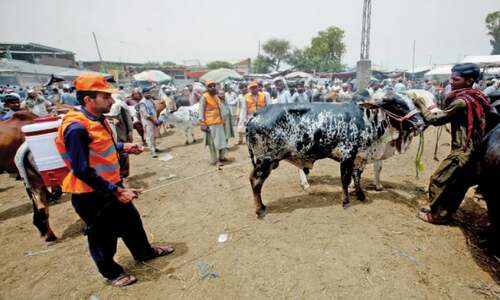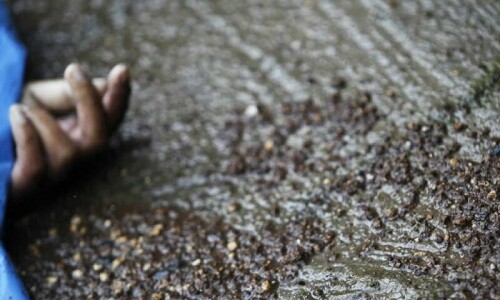PESHAWAR: With Crimean-Congo haemorrhagic fever infecting 14 people and killing four in Khyber Pakhtunkhwa during the last one and a half months, health experts have called for preventive measures against the tick-borne disease.
The cases of Congo fever have been reported after Eidul Azha at the end of June, according to a health department report.
It said two people killed by the infection were Afghan nationals, while the other two belonged to Khyber tribal and Charsadda districts.
The report said three of the confirmed Congo fever cases were Afghan nationals, while five were the residents of Peshawar district, two of Lakki Marwat district and one of Charsadda, Khyber and Kohat districts each.
The experts said the disease was spread by ticks from animals to humans or from humans to humans, so the people went down with it due to contact with sacrificial animals at cattle markets ahead of and during Eid days.
Experts advocate preventive steps against tick-borne infection
Former medical specialist at the Lady Reading HospitalProf Khalid Mahmoodtold Dawn that healthcare personnel were at risk from the CCHF during the provision of care to patients, so “standard precautions and patient isolation” were essential for the prevention of the disease.
He said no specific treatment was available for the potentially deadly disease, so its prevention was of paramount importance.
“Isolation of patients and supportive management are the mainstay of treatment,” he said.
Prof Khalid said the Congo fever was usually transmitted by ticks but it could also spread through contact with viraemiac animal tissues during and immediately post-slaughter of animals.
He said the main preventive measure included the avoidance of tick bites and exposure to tick infested animals as well as the use of personal protective equipment during risky environments and its control in animals by using insecticides in livestock. The expert said goats, sheep and hares served as the main hosts for the virus.
He said the disease’s spread was common immediately after the Eidul Azha festival was over and that the virus was transmitted from infected people to others by contact with infected blood or body fluid.
“Animals originating from endemic areas may be treated with pesticides two weeks before the slaughter to inhibit possible tick infestation,” he said.
Prof Khalid said gloves and PPE should be used by the people handling animals in endemic areas, while the outer side of the hide should never touch the surface of animal body and internal organs.
He added that butchers should not handle the hide without gloves.
“The waste and blood of animals should not be disposed of into streams and watercourses, but methods such as rendering, landfill and composting should be adopted to prevent the spread of the Congo fever,” he said.
The medical expert said antiviral drugs like Ribavirin had been tried both for prevention and treatment with no strong evidence in favour of its use.
He said patients generally had high fever and bleeding episodes and might get secondary infections.
“Vaccination of the exposed population in future and eradication of the tick population from the animals may lead to significant reduction in the disease burden in the endemic areas,” he said.
Former medical specialist at the LRH Prof Syed Amjad Taqweem, who currently works at the Health Net Hospital, Hayatabad, told Dawn that laboratory tests used to diagnose CCHF included reverse transcriptase-PCR, immunofluorescence assay, antibody (IgG, IgM) and antigen-capture Elisa, and virus isolation.
He said suspected patients of CCHF were primarily diagnosed by RT-PCR, which provided the highest detection sensitivity to active infection at the earliest.
Prof Taqweem recommended better awareness of the viral disease among the people as well as those handling animals.
“Suspected patients should be tested immediately and if they turn out to be confirmed cases, they should be isolated immediately,” he said.
He said the Congo fever was directly related to animal handling. “Ticks live in hot and humid environments, so animal migration takes place for Eidul Azha transmitting the infection to human beings. It is dangerous because of the high death rate,” he said.
Published in Dawn, Aug 6th, 2023












































